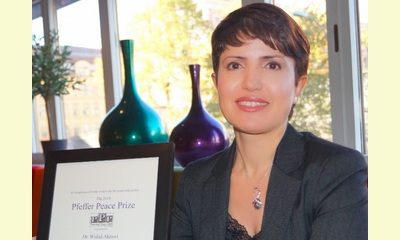|
|
Dr. Widad Akrawi Receives the Pfeffer Peace Award
un article par Linda Kelly, Fellowship of Reconciliation USA (abridged)
Each year the Fellowship of Reconciliation (FOR)
bestows three peace awards - international,
national, and local - to individuals or organizations
whose commitment to peace and justice is
recognized as extraordinary. This week, the 2014
international award was presented to Dr. Widad
Akrawi. 
Photo of Dr. Akrawi courtesy of Dr. Widad Akrawi and Defend International
click on photo to enlarge
The International Pfeffer Peace Award was
established in 1989 by Leo and Freda Pfeffer to
particularly honor those around the world working
for peace and justice. Leo Pfeffer was the United
States’ leading theoretician on religious liberty and
the separation of church and state, and he argued
these constitutional issues before the Supreme
Court. A long-time FOR member, Leo was a
founding member of the Jewish Peace Fellowship.
Leo died in 1993 and Freda died in 2013, but their
legacy continues to contribute to a more peaceful
society.
Dr. Widad Akrawi, a Danish citizen of Kurdish
ancestry, is considered one of Scandinavia’s most
successful female human rights defenders and
peace advocates. She is a global health expert,
author, lecturer, lobbyist, as well as the co-
founder and president of Defend International - a
nongovernmental organization devoted to peace,
democracy, diplomacy, human rights, and medical
research.
As an outspoken peace activist, Dr. Akrawi was
forced to leave the Kurdistan region of Iraq after
first Gulf War in 1991. She sought political asylum
in Denmark, where she established citizenship and
became a student, earning a master’s degree in
genetics and a Ph.D. in international health and
cancer epidemiology.
Dr. Akrawi was the first young woman of Middle
Eastern descent to advocate a ban on the illicit
trade of small arms and light weapons. She has
campaigned against gender-based violence,
torture, and other human rights abuses; and is an
advocate of chemical and biological disarmament,
conventional disarmament, and international
peace and security.
Among her many accomplishments, Dr. Akrawi
has created momentum in favor of a U.N.
resolution on a strong and an effective Arms Trade
Treaty to prevent the illicit trade in small arms and
light weapons that might be used for acts of
genocide, crimes against humanity, or terrorism.
She has also spoken out against armed gender-
based violence. She successfully lobbied for the
U.N. Declaration of Commitment to End Sexual
Violence in Conflict. . .
The 2014 International Pfeffer Award was
presented to Dr. Akrawi on Monday, October 13,
at an event arranged at the Oslo Peace House by
Trond Gunnar Rasmussen of FOR Norway. Rev.
Lucas Johnson, International Coordinator for the
International Fellowship of Reconciliation,
presented the award on behalf of FOR-USA with
members of FOR Norway attending. . .
In a gracious acceptance speech she said, “As the
first Scandinavian woman, the third European
citizen, and the first woman born in Kurdistan at
the heart of Mesopotamia, I am particularly
honored. But I wouldn’t be standing here without
the blood, sweat, and tears of the many human
rights defenders, peace advocates, civil society
activists, and my other fellow lobbyists. It has
been a true honor to collaborate with such brilliant
personalities.”
|








|
DISCUSSION
Question(s) liée(s) à cet article:
Do women have a special role to play in the peace movement?,
* * * * *
Commentaire le plus récent:
The 30 articles in CPNN linked to this question make it clear that women indeed have a special role to play in the peace movement. See the following for an historical explanation of why this is true.

|
|









